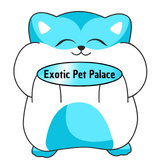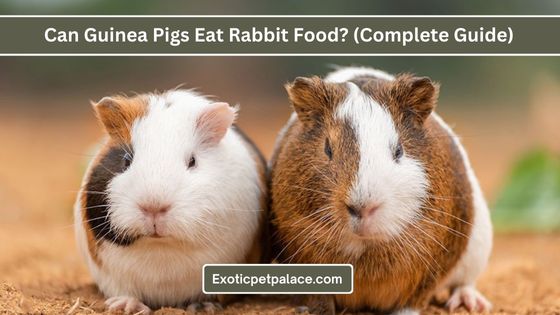Guinea pigs, also known as cavies, are adorable and social little creatures that have captured the hearts of pet owners worldwide.
But with their cuteness comes the responsibility of providing them with a healthy and balanced diet.
One common question that arises is “Can Guinea Pigs Eat Rabbit Food?”
The short answer is a big No.
In this article we are going to have a detailed debate on it.
Stay with me till the end.
Let’s start.
If you wanna learn more about “Exotic Pets”, Visit our YouTube channel👇
Understanding the Guinea Pig Diet
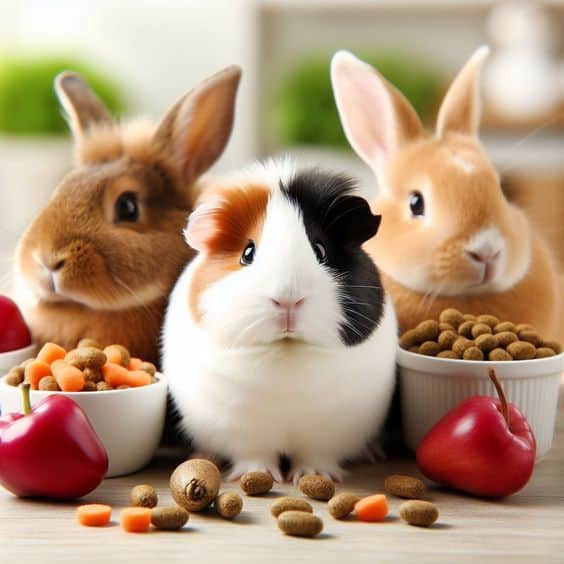
Guinea pigs are herbivores, which means their natural diet is mostly composed of plants.
In the wild, they would eat a variety of grasses, weeds, and other forages.
This diet supplies them with the vital nutrients they require to survive, including:
Fiber: Fiber is essential for your guinea pig’s digestive health since it keeps him full and prevents constipation.
Vitamin C: Guinea pigs, unlike humans and most other animals, cannot manufacture vitamin C. They need a steady supply of this vitamin to avoid scurvy, a potentially deadly illness.
Protein is necessary for tissue formation and repair, as well as general growth and development.
Calcium: Guinea pigs require calcium to maintain healthy bones and teeth.
Water: Guinea pigs, like all other living beings, require constant access to fresh, clean water.
So, let’s discuss Can Guinea Pigs Eat Rabbit Food?
Can Guinea Pigs Eat Rabbit Food?
Guinea pigs shouldn’t eat rabbit food as part of their daily diet.
While rabbit food is not harmful to guinea pigs, and an occasional feeding may not cause immediate harm, it lacks important elements that guinea pigs require, namely vitamin C.
Guinea pigs, unlike rabbits, cannot produce vitamin C on their own, hence they must receive it daily through their diet.
Rabbit diet does not often include the stabilized vitamin C found in guinea pig pellets, which is essential for their health.
A vitamin C shortage can cause major health problems in guinea pigs, such as scurvy, which is characterized by symptoms such as rough hair, dandruff, a decreased appetite, and Diarrhoea.
Furthermore, rabbit pellets may lack the fiber and protein that guinea pigs require, and they may contain seeds as a fat source, which guinea pigs cannot digest properly.
As a result, it is critical to give guinea pigs a diet designed exclusively for them, which includes:
- High-quality guinea pig pellets
- An unlimited supply of high-quality hay
- A daily portion of fresh green vegetables strong in vitamin C
- Fresh and clean drinking water.
I hope know you have got the answer of your question that Can Guinea Pigs Eat Rabbit Food?
Now let’s revise the reasons briefly that Why Guinea Pigs cannot Eat Rabbit Food?
Why Rabbit Food is Not Suitable for Guinea Pigs?
While rabbit food may appear to be similar to guinea pig diet, there are several significant nutritional differences that make it inappropriate for your cavy.
Here’s a list of the primary reasons why rabbit food might be harmful:
👉Lack of Vitamin C:
As mentioned earlier, guinea pigs require a consistent source of vitamin C.
Unfortunately, rabbit food typically does not contain added vitamin C, which can put your guinea pig at risk of developing scurvy.
Symptoms of scurvy include lethargy, weight loss, rough fur, and bleeding gums.
👉Imbalance of Nutrients:
The nutrient composition of rabbit food differs from that of guinea pig food.
Rabbit food is typically higher in calcium and lower in protein and fiber compared to what guinea pigs need.
This imbalance can lead to digestive problems, obesity, and other health issues.
👉Presence of Unhealthy Ingredients:
Some rabbit food formulations may contain seeds, nuts, or dried fruits.
While these ingredients might seem healthy, they are often high in sugar and fat, which are not suitable for guinea pigs.
Now the question is “what food do guinea pigs eat?”. Let’s discuss.
What Food Do Guinea Pigs Eat?
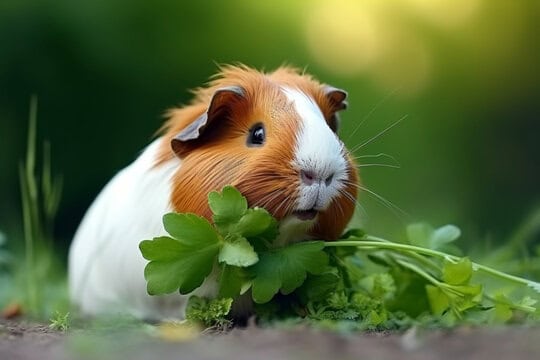
So, what exactly should a guinea pig’s diet consist of?
Here’s a breakdown of the essential elements:
👉Unlimited Hay:
Hay should be the primary component of your guinea pig’s diet.
It gives them the fiber they need for a healthy digestive system and helps wear down their ever-growing teeth.
Choose high-quality hays such as Timothy, orchard grass, or a meadow hay blend.
👉Guinea Pig Pellets:
Supplemented with hay, guinea pig pellets provide a concentrated source of essential nutrients like vitamin C, protein, and calcium.
Choose a reputable brand that caters specifically to guinea pigs’ needs.
👉Fresh veggies:
Guinea pigs like the flavor and nutritional value of fresh veggies.
Offer a variety of vegetables on a regular basis, but make sure they are safe.
Good choices include bell peppers, romaine lettuce, carrots (in moderation due to sugar content), and leafy greens.
👉Fruits (Occasional Treat):
Fruits can be offered as an occasional treat, but only in very small quantities due to their high sugar content.
Good options include strawberries, blueberries, and apple slices (again, in moderation).
As we have discussed earlier that vitamin C is very essential for Guinea Pig. Now the question is How do I provide enough vitamin C to my guinea pig?.
Let’s discuss.
How to Provide Enough Vitamin C to Guinea Pig?
Ensuring your guinea pig gets enough vitamin C is crucial for their health.
Here are some effective ways to provide vitamin C:
◾Fresh Vegetables:
Incorporate a variety of fresh vegetables high in vitamin C into your guinea pig’s daily diet. Some excellent choices include:
- Bell peppers (all colors)
- Parsley
- Kale
- Broccoli
- Brussels sprouts
◾Fruits:
Fruits can be given as occasional treats due to their sugar content. Good options are:
- Kiwi
- Strawberries
- Oranges (in moderation)
◾Guinea Pig Pellets:
Choose high-quality guinea pig pellets with stabilized vitamin C.
This guarantees that your pet gets a constant dose of vitamin C every day.
◾Vitamin C Supplements:
If necessary, supplement with guinea pig-specific vitamin C pills or human chewable vitamin C tablets (be sure they are solely vitamin C and not a multivitamin).
Most adult guinea pigs should take one-quarter of a 100 mg pill daily.
Remember to give your guinea pig these meals in suitable proportions, and consult with a veterinarian for precise dietary advice.
Also, avoid adding vitamin C to water because it degrades fast and may change the flavor, leading to less water consumption.
Guinea pigs excrete any extra vitamin C, so there’s no risk of overdosing on natural sources.
However, it is still necessary to balance their diet to avoid additional problems, such as bladder stones, which can be aggravated by a high calcium consumption.
Always ensure that fresh, clean water is accessible and that the food is changed to meet all nutritional requirements.
What Are Signs of Vitamin C Deficiency in Guinea Pigs?
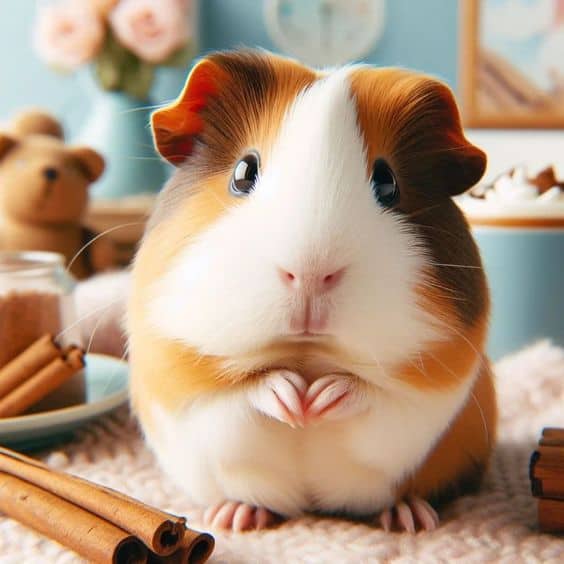
Vitamin C deficiency, also known as scurvy, can have several signs in guinea pigs.
If your guinea pig is not getting enough vitamin C, you might notice the following symptoms:
- Poor coat condition: The hair may grow coarse, and the skin may seem unhealthy.
- Lethargy refers to a noticeable lack of energy or enthusiasm for tasks.
- Weight loss: Unexpected weight loss despite frequent eating.
- Abnormal tooth wear: This can lead to difficulty eating.
- Swollen joints cause difficulty moving and walking.
- Delayed wound healing refers to cuts or sores that do not heal as rapidly as they should.
- Poor appetite: An unwillingness to eat, which can lead to additional health problems.
- Diarrhoea: This might happen if the deficit affects your digestive system.
These symptoms can appear quickly, particularly if the guinea pig’s diet is significantly lacking in vitamin C.
Any indicators of inadequacy should be addressed immediately by seeing a veterinarian and changing the diet to ensure appropriate vitamin C consumption.
Remember that prevention is vital, therefore feeding your guinea pig a well-balanced food rich in vitamin C is the best way to keep them healthy.
Best Guinea Pig Food And Vitamin C Supplement Brand:
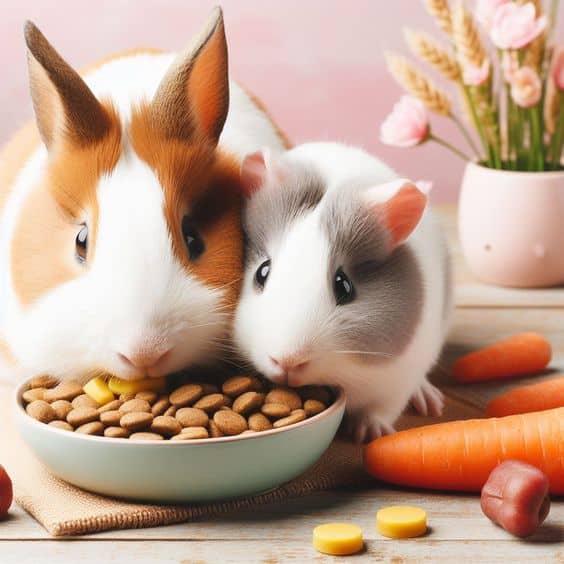
When it comes to choosing guinea pig food, Oxbow is a popular and respected brand amongst pet owners.
They offer a variety of hay, pellet, and treat options specifically formulated for guinea pig health.
Here’s a quick overview of some of their products:
👉Oxbow Timothy Hay:
This is a high-fiber hay that is perfect for keeping your guinea pig’s digestive system healthy.
👉Oxbow Cavy Cuisine Complete Pellets:
These pellets provide a balanced diet for guinea pigs, containing all the essential nutrients they need.
👉Oxbow Simple Rewards Hay & Herbs Treats:
These treats are a healthy and fulfilling way to thank your guinea pig, with hay and safe herbs.
👉Oxbow Vitamin C Supplements:
Oxbow is a well-known company that sells vitamin C supplements designed exclusively for guinea pigs.
They make a vitamin C pill (GTN-50C) for guinea pigs that is flavored and frequently accepted by pets as a reward.
Each tablet includes 50 mg of encapsulated vitamin C, which Oxbow claims is stable for a year from the date of manufacturing.
Another choice is Oxbow’s Natural Science Vitamin C supplement, which is part of a range of health supplements for tiny dogs.
These vitamins, which come in tablet form, might be a practical method to ensure that your guinea pig gets enough vitamin C each day.
To ensure that your guinea pig receives the appropriate quantity of vitamin C, follow the dose recommendations supplied by the manufacturer or your veterinarian.
Always contact with a veterinarian before beginning any new supplement to ensure that it is appropriate for your pet’s unique health requirements.
Conclusion:
You can guarantee your guinea pig lives a long and happy life by understanding his or her nutritional needs and avoiding things that might hurt them, such as rabbit chow.
Remember, a constant diet rich in hay, guinea pig pellets, and fresh veggies will help your furry companion stay healthy and thrive.
If you have any queries or concerns regarding your guinea pig’s nutrition, please see your veterinarian for personalized guidance.
FAQs
Safe veggies for your guinea pig include:
👉Leafy greens like romaine lettuce
👉Red and green leaf lettuce
👉Mustard or turnip greens
👉Herbs like cilantro and parsley
👉Bell peppers
👉Broccoli
👉Tomatoes are also good options, but limit them to a few times a week.
Avoid iceberg lettuce, cabbage (can cause bloating), and anything with seeds or pits.
Guinea pigs can’t produce their own vitamin C, so it’s crucial in their diet.
Fresh vegetables high in vitamin C like bell peppers and broccoli are good daily options.
Your vet may also recommend a daily supplement, like chewable tablets or drops in their water bottle.
Fresh vegetables can be offered once a day, with a portion size of about 1/2 to 1 cup per guinea pig.
Yes, bell peppers, broccoli, kale, and parsley are all good natural sources of vitamin C for guinea pigs.
Start slowly with any new food, including supplements.
Offer a small amount at first and monitor your guinea pig for any digestive issues.
Gradually increase the amount over a few days if they tolerate it well.
